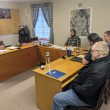After last year’s legislative session, many rural Oregonians are paying close attention to what’s going on in Salem.
That’s a good thing. Engaged citizens are necessary not only for our system of government to function correctly, but it keeps politicians on their toes.
It isn’t easy to pay attention. Even dedicated newspaper reporters who cover Salem found it nearly impossible to keep tabs on the 4,000-some bills that made appearances during last year’s long session. There weren’t enough reporters to follow the tendrils running everywhere. It was a maze.
But rural residents have made it pretty clear they’ve got their focus directly on the Capitol as legislators plow through a short session – 35 days. The nearly 10,000 people, including many from east Linn County, who showed up at the Timber Unity Rally reported in our story on page 1 are clearly concerned about what’s happening in the Capitol.
They should be. Lawmakers have already introduced some 250 pieces of legislation. It will be impossible for more than a few of those to get to the finish line in that time – and that’s a real problem.
Democrats, with supermajorities in both chambers and control of the governor’s office, say they’ll tackle the state’s most urgent issues.
They insist they are honoring the purpose for which voters created legislative short sessions in 2010: addressing budget and policy matters that cannot wait, and completing unfinished business.
Their list includes a slightly reconstituted cap-and-trade bill, restrictions on gun owners, plus a bunch of new stuff: bans on flavored vaping products, campaign contribution limits, independence for the state public records advocate, mental health, foster care, controls on the sale of kratom, proposals for combating wildfires, and changing rules for quorums.
Oh, and Gov. Kate Brown wants voters to amend the state constitution to permit the state to impose real estate transfer taxes on property sales of over $500,000.
That proposal comes after House Speaker Tina Kotek, D-Portland, announced she plans to ask lawmakers to declare a housing state of emergency in Oregon and that she would push a $120 million package meant to help communities establish shelters and provide low-income housing.
Not everything on that list is bad. But to do all or even some of it in 35 days? It’s foolish, which should be obvious.
We should all be concerned.
State Sen. Kim Thatcher (R-Keizer), speaking to the crowd at the Timber Unity rally at the capitol last week, described it as a “rushed, and rigged short session.”
Are we just being cranky? Paranoid, perhaps?
We don’t think so, particularly when we do the math: There are roughly 250 bills on the table, there is acrimony in the capitol after last year’s legislative circus, the “unfinished business” includes that cap-and-trade move and urban legislators’ desires to make sure every gun in Oregon has a lock on the trigger.
In short, what we see here are large steps toward Big Brother offering the state’s residents safety and security – at a cost: more control and more taxes, because nothing is free, particularly in government. Call that simplistic reasoning, but it’s reality.
We’re in an extended period of economic boom, in which the state’s unemployment rates are at historic lows. Democratic lawmakers are in the driver’s seat and control the steering wheel – and the brakes.
All state residents should be very concerned, because it’s becoming increasingly evident that what’s really driving this is greed – for more tax dollars.
Take that big item back on the table: the revival of the greenhouse gas cap-and-trade bill.
The majority in Salem has made it clear they’re determined to make Oregon a ground-breaker in reducing our carbon footprint, in combating global warming, even though our state reduced its CO2 emissions by 8.3 percent between 2000 and 2016, and 0.2 percent between 2015 and 2016.
It’s true that Oregon has a high per-capita emissions rate, compared to other states, but in 2016, the most recent years for which rankings are readily available, we ranked 38th in total emissions – below North Dakota, which has less than one-fifth the population we do, one of 15 states ranked above us in total output that have smaller populations than our state.
We’re certainly not suggesting it’s OK to pump pollution willy-nilly into our atmosphere. But our legislative leaders appear to be stubbornly blind to the fact that this isn’t really a giant problem for the current health and welfare of our state, and we wonder if their motivation is simply to make a point – thank you, Mr. Trump.
But legislators’ disinterest in hearing arguments to the contrary suggests there are other, disingenous, motives.
It’s evident that there’s a financial advantage for the state in getting this passed: Those carbon credits that major polluters will have to purchase are really no more than a tax on use of fossil fuels. And since nearly all of us rural residents use such fuels – for travel, work, heating, etc., we’ll be paying more because we tend to travel longer distances than most of our city cousins.
All of this is going to result in trickle-down – higher prices on all fronts that we, the citizens, will pay.
Given all this, in a short session, what might our legislators address that would solve real, significant problems?
We like the idea of more construction of housing for those who need it, though sneaking another under-the-rug sales tax past the state’s populace, on the heels of that billion-dollar Gross Receipts Tax that we’re left with after last year’s long session, is not the way to do it.
How about coming up with real fixes for the foster care problem, for the wildfire threat, for the ongoing threat to the public’s access to government activities?
The legislature’s attempt to get us voters to change quorum rules , to allow legislative houses to convene with only a simple majority of lawmakers present instead of the current two-thirds requirement, worries us.
Democrats argue that only three other states have Oregon’s requirement, but it’s funny it hasn’t really been a concern until last year’s Republican walkout. The Democrats didn’t think it was a problem when they similarly walked out in 2001, when Gov. Brown was the Senate Democratic leader.
At least, we get to decide.
The Timber Unity rally turned some heads, but this legislature will need to be reminded throughout this session that their actions will have consequences. These politicians are elected by people. Any change will start with the populace.
Rural residents who are concerned about what’s happening in the Capitol can’t sit back and watch.
To stay informed, a good way to start is paying attention to what’s conveyed by their own legislators and groups like Timber Unity, and news media that report what’s happening in Salem, particularly oregoncapitalinsider.com, a joint effort by newspapers to stay on top of things.
Also, word of mouth is important. Rural residents need to make sure their city cousins, who may be largely removed from the realities of life here, know what’s happening. Try to connect with friends and relatives who live in urban areas that voted this supermajority in. Tell them your story.
Call, write and vote. Rent billboards. Input has a much greater effect in the halls of government than most of us think, because politicians assume (probably correctly) that one voice represents thousands who didn’t bother to call.
They’re watching the numbers. It’s incumbent for rural residents to make sure the numbers say something.





